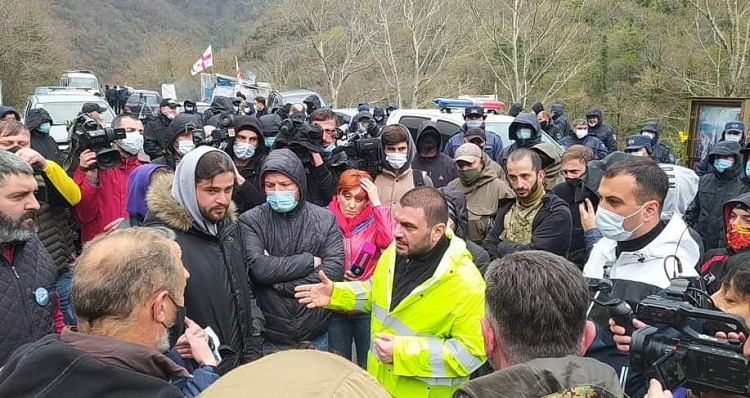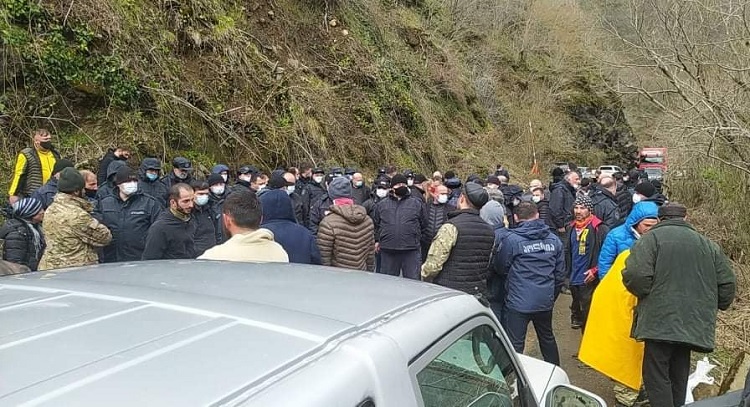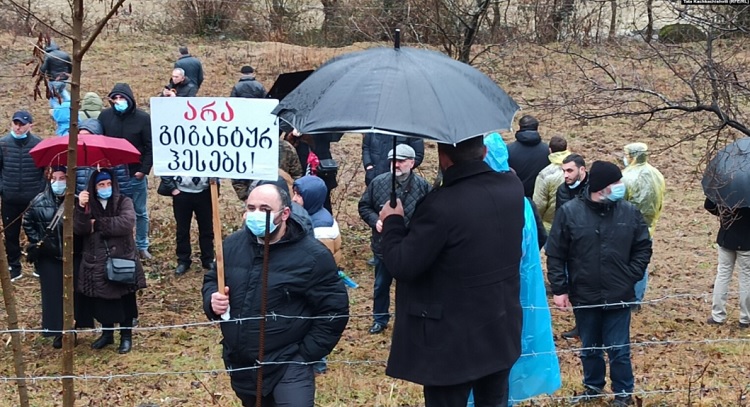Police detain two during clash over Namakhvani HPP in western Georgia

Locals and activists have earlier met with Merab Lominadze - new director of the Turkish company Enka Renewables which is in charge of the construction. Photo: Davit Katsarava/Facebook
Two protesters have been detained during a clash with police over the Namakhvani hydro power plant (HPP) in the western Georgian region of Imereti.
The Interior Ministry has announced that police officers have been mobilised in Rioni gorge since morning to maintain the rule of law amid the resumption of the HPP preparatory works.
The ministry calls on citizens ‘to act in full compliance of the law on freedom of expression and adhere to the rightful demands of the police’.
For security reasons, the movement of citizens in the Rioni gorge in certain directions is temporarily restricted… Police infrastructure is mobilised at the site, including a special vehicle that ensures smooth operation of radio communications”, the ministry said.
Georgian Economy Minister Natia Turnava stated in mid-March that the construction of the main facilities of the Namakhvani HPP, in particular the dam and the reservoir, will be suspended until major studies are re-verified and validated, while construction of the auxiliary infrastructure will continue.
 Photo: Davit Katsarava/Facebook
Photo: Davit Katsarava/Facebook
However, locals and activists who have earlier met with Merab Lominadze - new director of the Turkish company Enka Renewables which is in charge of the construction - claim that the construction is actually underway now.
Stating that ‘the government has declared a war’, Facebook user Magda Revishvili reported earlier today that internet connection has been blocked to disable communication in the gorge with the rest of the world.
Civic activist Davit Katsarava has also reported that te Turkish company continues its works ‘under the strong police defence’. “This story will not end that easy”, he wrote on Facebook.
 Locals and activists have been patrolling the site for several months days now opposing to the construction. Saying no to 'giant' HPPs the protesters say the construction is illegal and against the will of the local population. Photo: Tata Kachkachishvili/RFERL
Locals and activists have been patrolling the site for several months days now opposing to the construction. Saying no to 'giant' HPPs the protesters say the construction is illegal and against the will of the local population. Photo: Tata Kachkachishvili/RFERL
The Namakhvani HPP Cascade Project entails the construction of two hydroelectric power plants on the Rioni river in Georgia’s Tskaltubo and Tsageri municipalities:
- The Lower Namakhvani HPP - 333 MW
- The Upper Namakhvani HPP - 100 MW
Being implemented with a direct foreign investment of USD 800 million, the construction company says it is 'the largest energy project in the history of Georgia’s independence'.
The Georgian government expects the HPP to provide Georgia with 12% of its electric energy needs once completed; around 1,600 citizens are expected to be employed for the project.
 Tweet
Tweet  Share
Share